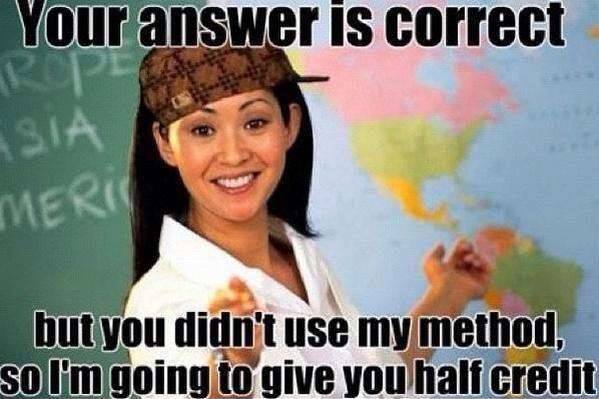Your answer is correct, but you didn't use the correct method, so I am going to give you half credit
 Tom was unhappy because he didn't get a full credit for this question:
Tom was unhappy because he didn't get a full credit for this question:
Simplify 6 4 1 6 .
"Teacher, why I can't get full credit for this question?"
"Your answer is correct, but you didn't use the correct method, so I am going to give you half credit."
Actually what Tom did was simply cancel the two "6" that appear in the question as shown: b c a b = c a 6 4 1 6 = 6 4 1 6 = 4 1 Although Tom had gotten the correct answer, his method was wrong since 16 and 64 are 10+6 and 60+4 but not 1x6 and 6x4. Therefore, the "6" cannot be cancelled as shown in this method. But sometimes Tom's method is lucky and computes the correct solution.
For which of these fractions will Tom's method give a correct answer?
This section requires Javascript.
You are seeing this because something didn't load right. We suggest you, (a) try
refreshing the page, (b) enabling javascript if it is disabled on your browser and,
finally, (c)
loading the
non-javascript version of this page
. We're sorry about the hassle.
2 solutions
If you know your multiplication tables.
By Tom's method, in the option 19/95, that is 9 is cancelled so the answer is 1/5 and by the correct method also the answer is 1/5. So the answer is 19/95.
the condition is too hard to memorize
[ab] ÷ [bc] = a ÷ c requires that
c = (10 a b) ÷ (9a + b)
Log in to reply
I'll help! 95/19 = 5, so, it's 1/5, 1/5 = 1/5, get it now?
Please text if you need further info, clarification, or need it to be explained in greater detail.
Hope you understand!
But if you go for the general condition, it's like this : ab/bc = ac holds true only when
10a{b - c} = c{b - a} . Right?
For quick answer, multiply 19 by 5